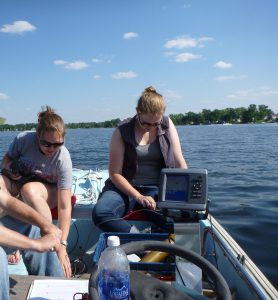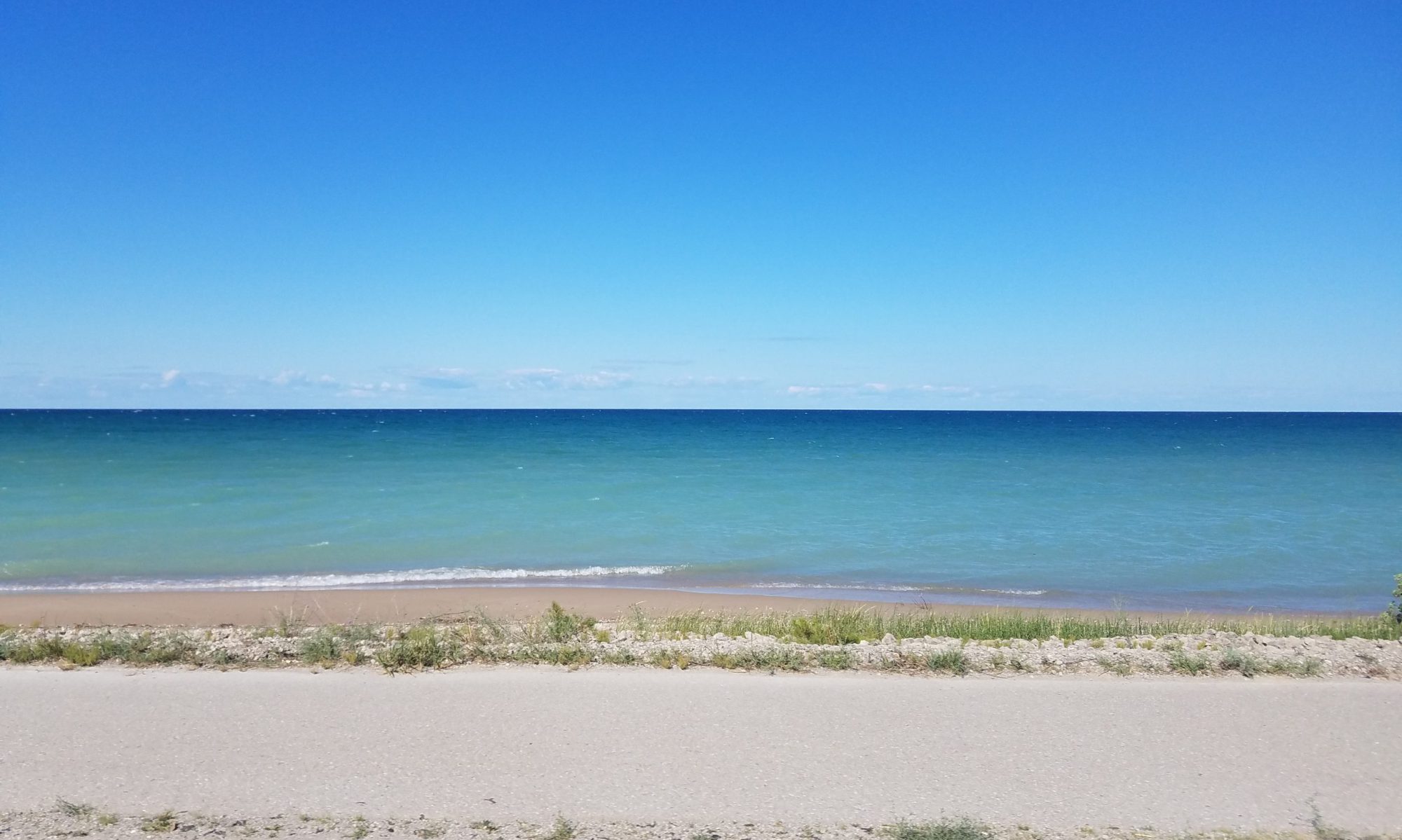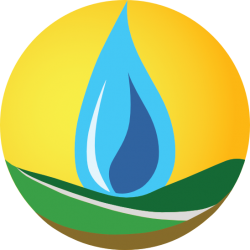
Our graduate program in Hydrogeosciences offers a world-class interdisciplinary research-based education, training graduates for rewarding careers in industry, government, and academia. Students graduate from our program with not only a degree, but a strong professional network and lifelong friendships. The program is fast-paced, and expects students to excel in all areas of their graduate careers: classes, research, and teaching. Course offerings both in the Geological Sciences Department and across campus offer students a solid academic foundation, while participation in externally-funded research projects provides critical skills in research and collaboration. Because our research is fundamentally interdisciplinary, we attract students from a wide range of backgrounds interested in water-related research with applications from agriculture, to ecology and water resources. Graduate student guidance committees typically involve professors from departments across campus, bringing them broader exposure to other related research fields.
Graduate Degrees
The Department of Geological Sciences offers several graduate degrees: Master of Science and Doctor of Philosophy in Environmental Geosciences, and Master of Science and Doctor of Philosophy in Geological Sciences.
Students may also choose to get a doctoral specialization in Environmental Sciences and Policy. This certificate teaches a variety of modeling skills giving students a wide range of knowledge in the theory as well as hands on application of modeling. Due to the highly interdisciplinary program, the broad knowledge of models can be applied to specific research interests across many disciplines.
- Prospective Graduate Students (Geological Sciences)
- Doctoral Specialization (Environmental Sciences and Policy Program)
- Application Information (Geological Sciences)
- Degree Requirements (Geological Sciences)

Graduate Courses
ENE 801 – Dynamics of Environmental Systems
Principles of mass balance, reaction kinetics, mass transfer, reactor theory in environmental engineering.
GLG 803 – Seminar in Hydrogeology: Research Training Program
Two- or three-semester seminar class focusing on practical training for graduate students. The first semester focuses on how to conduct literature research, and communicate in written, visual, and oral forms. The second teaches basic computational methods and data management, preparing students for today’s large dataset projects. The third introduces formal fieldwork planning, preparation, execution, and wrap-up skills, teaching students how to conduct professional fieldwork.
GLG 811 – Advanced Hydrogeology
Processes influencing groundwater flow and solute transport. Mathematical equations and numerical methods to describe these processes.
GLG 821 – Aqueous Geochemistry
This course examines the chemical structure of water. This includes many of the pollutants put into the water by humans as well as the natural chemistry of water. Basic statistics is used to analyze water samples. Also, models are used to examine the chemical compositions.
CE 821 – Groundwater Hydraulics
Physical properties of porous media. Equations of flow in saturated media. Flow nets, well flow and parameter measurement. Transport processes and the advective-dispersion equation for conservative contaminants.
ENE 822 – Groundwater Modeling
This course is designed to teach basic groundwater modeling and analysis. The course will explain how to create models that demonstrate surface and groundwater interaction, groundwater flow, and reactive contaminant transport. Also, numerical methods will be used to help calculate flow using contaminant transport equations.
ENE 823 – Stochastic Groundwater Modeling
Analysis and modeling of flow and solute transport in heterogeneous aquifers. Geostatistics and variogram modeling. Upscaling and effective models. Uncertainty modeling. Perturbation methods and Monte Carlo simulation.
GLG 824 – Stable Isotope Biogeochemistry
Principles of stable isotope chemistry applied to biogeochemical problems: climate change, ecology, contaminants, oceanography, limnology, and paleobiology.
ENE 829 – Mixing and Transport in Surface Waters
Waves, tides and shallow-water processes. Numerical solutions and applications of shallow-water equations to lakes, rivers and estuaries. Principles and processes of sediment transport, and dispersion of materials in surface waters. Wind-driven circulation in Lake Michigan.
EC 829 – The Economics of Environmental Resources
This course studies the economics behind public policy issues which relate to the environment. This includes environmental conflicts as well as alternatives to current public policy. The course covers a wide range of disciplines from biology to geology. Several topics which will be discussed include water quality, fish and wildlife, and land use change. The course also includes preventative measurements such as conservation, development, and worldwide issues.
ESP 850 – Introduction to Environmental and Social Systems Modeling
This course teaches students the background theory of different models and different problems which may occur. This helps students learn which models to use in different situations.
CSS 850 – Soil Chemistry
Throughout the semester, students will learn the different chemical components of soil composition. One key element of the course is studying ions in the soil and how they react with one another. Students will examine pH, nutrients and other aspects that are found in soil and affect plants.
GEO 866 – Spatial Data Analysis
Theory and techniques for statistical analysis of point patterns, spatially continuous data, and data in spatial zones.
ESP 869 – Geosimulation
Theoretical concepts related to simulating dynamic geographic phenomena in the intersection between human and natural systems. Innovative agent-based methodology applied to complex social-environmental systems. Hands-on experience of agent-based modeling, with special emphasis on modeling human decision-making and its impact on the natural environment.
GLG 873- Numerical Methods
Introduction to Linux and C including numerical methods, integration, curve-fitting, and differential equations with an emphasis on applications to the geological sciences.
GLG 882 – Basin Analysis
Paleogeographic evolution of sedimentary basins. Principles of facies analysis, subsidence history, thermal history and diagenesis. Methods of stratigraphic analysis.
ENE 891 – Selected Topics: Intro to Systems Modeling
In-depth study of selected environmental science and policy issues.
GLG 893 – Special Problems in Hydrogeology: Biological Modeling
This class focuses on the SALUS model. The SALUS model is used to model agricultural management techniques. Different techniques include runoff and crop/soil interaction.
FW 893 – Seminar in Coupled Human Natural Systems (CHANS)
Study and research in advanced problems and current developments in fisheries and wildlife.
GLG 898 – Special Problems in Enviornmental Geosciences
Individual study on problems in environmental geosciences.
ENE 900 – Research Strategies and Methods in Environmental Engineering and Science
This is an intro course for graduate students doing research dealing with the environment. Students will learn many skills which can be applied to successfully completeing graduate school such as reviewing journal articles, determining criteria for quality research, giving presentation, and writing papers and proposals.
GLG 901 – Friday Seminar Series
Every Friday, the department invites a professor from another university to present their research. This gives students the opportunities to hear what types of other research is being performed outside of the university.
PSY 992 – Seminar in Psychology: Matlab for Behavioral Scientists
This seminar class focuses on Matlab understanding. Student will be able to gain Matlab skills and apply them to their research.

